Knowledge will forever govern
ignorance, and a people who mean to be their own governors,
must arm themselves with the power knowledge gives. A popular
government without popular
information or the means of acquiring it, is but a prologue to a farce
or a tragedy or perhaps both.
-- James
Madison --
 auf Deutsch über das gleiche Thema:
http://wkeim.bplaced.net/files/familienrecht.htm
auf Deutsch über das gleiche Thema:
http://wkeim.bplaced.net/files/familienrecht.htm
Walter Keim, Email: walter.keim@gmail.com
Torshaugv. 2 C
N-7020 Trondheim, 9. March 2012
European Parliament
Committee on Petitions
Rue Wiertz
B-1047 BRÜSSEL
Copy: MEP Philippe Boulland, MEP Mrs Erminia Mazzoni, MEP
Rainer Wieland, Parliamentary
State Secretary of Justice Dr. Max Stadler, Commissioner for Human
Rights of the Council of Europe CDH 116/11, Commission on European Family
Law (CEFL)
Jugendamt, Human Right of Access to
Public Documents and Good Administration (Petition Number
0748/2012)
Dear Mr. Boulland, dear Mrs Mazzoni,
I am a German Citizen and retired college lecturer.
I refer to the investigations of the European Parliament concerning 120
petitions about the Jugendamt. The petitions raise the question if the
European Convention of Human Rights, the UN Convention on the Rights of
the Child and the European Charter of Fundamental Rights are violated. It
is shocking that nothing is done with these structural problems.
Petitioners report on denials of access to documents and unfair treatment.
I asked the Parliamentary
State Secretary of Justice Dr. Max Stadler,
MEP
Wieland and the parliament
Bundestag to implement the report CommDH(2007)14 about Germany of
the Commissioner for Human Rights of the Council of Europe (Appendix E)
and guarantee real independence of judges according to Recommendation
No. R (94)12 and PACE Resolution 1685 (2009) to cure the problems.
The Human Right Commissioner suggested to strengthen the mandate of the
German Institute for Human Rights with regard to structural and factual
monitoring, develop the national action plan on human rights. Judges and
administration should be educated in human rights.
The human right of access to public documents (ICCPR, European
Court of Human Rights)
is recognized as precondition for democracy and essential in the fight
against corruption.
18. June 2007 I wrote to MEP Rainer Wieland (Appendix
N), that Germany was least developed in Europe looking at the human
right of access to public documents (Appendix
G, H)
and mentioned the Bamberg Declaration (Appendix
X). But the situation got even more serious.
Now many countries outside Europe are more advanced then Germany looking at
freedom of information, transparency and fight of corruption.
- 84 states with approx. 5.5
billion inhabitants give better access to information then the
federal Freedom of Information Law in Germany (http://www.rti-rating.org/country-data/).
- more than 115 states (http://right2info.org/laws)
with more then 5.9 billion inhabitants
adopted Freedom of Information (FOI) laws or provisions in
constitutions.
- 5 German states with half of the population lack FOI laws.
- The UN Convention against Corruption is ratified by 160 states with
more then 6.5 billion inhabitants, but not by Germany (Appendix
A). Germany did not ratify the Criminal Law Convention on
Corruption and does not follow Recommendation Rec(2003)4 on common rules
against corruption in the funding of political parties and electoral
campaigns of the Council of Europe as GRECO (Group of States against
Corruption) suggested 4. December 2009 (Appendix
B, Appendix
C).
- Germany is the only state in Europe which has not ratified any of
these to conventions against corruption (Appendix
D).
In January 2012, Transparency Germany published the National Integrity
Report (NIS): - 84 weaknesses in the fight against corruption (Appendix
Y). The report is part of an initiative of the European Commission in
the fight against corruption. Germany has to improve the federal FOI law,
adopt FOI laws in 5 federal states (Bundesländer), ratify CoE and UN
conventions against corruption and improve transparency of sideline jobs for
members of parliaments and funding of political parties to catch up with
other states (see weakness no. 2, 3, 4, 8, 34, 35 and 52 of the NIS).
German authorities both legislative, executive power and judiciary do not
respect the human right of access to public documents a precondition of
democracy. Even the public, NGOs
and the press are not able to recognize the problem. This is unlike all
other civilized countries, e. g. Europe, OSCE and OECD and is not acceptable
for non-Germans.
Parliamentary
State Secretary of Justice Dr.
Max Stadler did not answer the question by www.abgeordnetenwatch.de
when Germany will adopt (better) FOI laws and ratify the anti-corruption
conventions (Appendix
4) and implement the suggestions of the Commissioner for Human Rights
of the Council of Europe (Appendix
3). MEP Rainer Wieland did not answer these questions (Appendix 5)
51 states
participate in the Open Government Partnership (OGP) for transparent
accountable governments. This OGP
initiative wants governments to commit to openness, participation
for citizens, fight against corruption and use of new technologies. But
Germany does not participate, even it would be very necessary.
This rejection of the human right of access to information and
transparency in Germany is outstanding in EU, Europe, North- and
South America and the civilized world. However German politicians deny
these facts and do nothing about the problem.
Therefore the European Court of Human Rights (ECtHR) is important. In
Article 8 of the ECHRFF
family rights are protected. Article
10 ECHRFF secures Freedom of Information. However the ECtHR has an
overload of cases and demands that all domestic remedies must be tried
first. i. e. national courts up to the highest level. The costs of
domestic remedies are unreasonable high, because a lawyer has to be hired
for higher courts.
The Human Rights Commissioner of the Council of Europe visited Germany
and published the report CommDH(2007)14 with many suggestions, i. e.
promote independent extrajudicial complaints bodies and educate judges and
administration in human rights (Appendix
H). However the national parliament Bundestag rejected even to
discuss (Appendix
P) these suggestions and petitions to 11 local parliaments where
rejected (Appendix
Z).
UN,
OSCE and AOS Special Mandates for Protecting Freedom of Expression confirmed in Joint Declaration of 6. December 2004, that access to information is a human right: (Appendix
1):
"The right to access information held by public authorities is a
fundamental human right which should be given effect at the national
level through comprehensive legislation (for example Freedom of
Information Acts) based on the principle
of maximum disclosure, establishing a presumption that all
information is accessible subject only to a narrow system of
exceptions."
The federal FOI law violates the principle
of maximum disclosure. 5 federal states violate the human
right of access to public documents. i. e. no FOI law is adopted.
The "General Comment No. 34 on Article 19 of the ICCPR" confirms
this (Appendix
J):
"18.
Article 19, paragraph 2 embraces a general right of access to
information held by public bodies. Such information includes all records
held by a public body, regardless of the form in which the information
is stored, its source and the date of production."
"19. (.) States parties should also enact the necessary
procedures, whereby one may gain access to information, such as by means
of freedom of information legislation."
The UN Human Rights Committee decided that the International Covenant on
Civil and Political Rights (ICCPR) Article 19 (3)
recognizes the right of individuals and the media to receive state-held
information without requiring a demonstration of direct interest
(Appendix L).
The European Court of Human Rights recognizes the human right of access
to public documents (Appendix
M).
The CoE Human Rights Commissioner suggested to educate administration and
judges in international law and human rights (Appendix
E). The refusal to give access to the reason of Bavaria not to follow
these suggestions (Appendix
F), shows that this suggestion is important.
However the denial of the human right of
access to public documents is just the tip of the iceberg.
In direct contact with administration the right to good
administration according to Recommendation
1615 (2003) of the Parliamentarian Assembly of the Council of Europe
and CoE Recommendation
Rec(2007)7 on good administration and Charter
of Fundamental Rights of the European Union in EU is missing in Germany, i. e.
- Every person has the right to have his or her
affairs handled impartially, fairly and within a reasonable time (Article
41 (1))
- The right of every person to be heard (Article
41 (2))
- The right of every person to have access to his
or her file (Article
41 (2))
- The obligation of the administration to give
reasons for its decisions (Article
41 (2))
- Right of access to documents (Article
42)
- Ombudsman (Article
43)
According to CoE RECOMMENDATION
No. R (85) 13 an independent Ombudsman for public administration
should be empowered "to investigate and give opinions when human rights are
involved". Germany is the only country in Europe which "reserved the right
to comply with it or not" (Appendix E).
The Parliamentary Assembly confirms in in Recommendation
1615 (2003) the importance of the institution of ombudsman within
national systems for the protection of human rights and the promotion of the
rule of law, and of its role in ensuring the proper behaviour of public
administration (Appendix
F).
Administration and Jugendamt are not subject to investigations and control
of an independent ombudsman. German authorities claim that courts guarantee
the rights of citizens. However most victims can not risk to go to court,
because of high costs.
But German judiciary lacks independence according to Art. 6 European
Convention
on Human Rights and Fundamental Freedoms
(ECHRFF)) to protect citizens
rights and human rights against the "Jugendamt" and other authorities.
But
Article
2 of the Treaty on European Union reads:
"The Union is founded on the values of respect for human
dignity, freedom, democracy, equality, the rule of law and respect for
human rights, including the rights of persons belonging to
minorities."
Unfortunately only new members are evaluated and must adopt these norms.
Germany violates e. g. the following international principles:
- Independence of judges, i. e. separation of powers is not done,
violation of Art. 6 of European Convention on Human Rights i. e.
Recommendation No. R (94)12 and PACE Resolution 1685 (2009) (see Appendix
O, Q)
- Human right of access to public documents (information) is still
lacking in 5 of 16 states (länder) (see Appendix 2), which is found
all over Europe and the civilized word.
- Decriminalisation of punishment of defamation (insult, libel)
according to OSCE (Appendix
S, T). Up to now 180 000 accused i.
e. 20 % of criminal prosecution cases are insult (Appendix
U).
Even sending copies of petitions about decriminalization of defamation
and suggestions of the Human Rights Commissioner CommDH(2007)14 was
answered by a threat of insult accusation (Appendix
V and W).
It seams that no progress has been made since 21. October 2007 when the “Bamberg
Declaration” (Appendix
X) concluded: Within the framework of the child and youth protection
in Germany, especially on the part of the youth welfare offices, there are
violations of Human Rights, in particular of Article
3, Article 6,
Article 8, Article
13 and Article
14 of the European
Convention of Human Rights.
Without improving respect of human rights
in Germany, petitions will continue. Foreigners and a growing number
Germans will not accept human right violations.
I have written two dozen petitions to German parliaments on separation of
powers, human rights and good administration without result (Appendix 2).
I appreciate that the European Parliament looks into these human right
violations and visited Germany.
Sincerely,
Walter Keim
Copy: German Institut for
Human Rights, Menschenrechtszentrum, BMJ, Lehrstuhl für
Menschenrechtsbildung, Menschenrechtsbeauftragter
der
Bundesregierung, Ausschuss
für
Menschenrechte und Humanitäre Hilfe
Appendices:
- 08. April 2011: Freedom
of Information is missing in the 6. state report of Germany according
to Article 40 of the Civil Covenant CCPR
. http://wkeim.bplaced.net/files/foi-ccpr-de.htm
- Two dozen of petitions about access to public
documents and the right to good administration: http://wkeim.bplaced.net/petitions.htm
- Parliamentwatch: http://www.abgeordnetenwatch.de/dr_max_stadler-575-37975--f326570.html#q326570
- Parliamentwatch: http://www.abgeordnetenwatch.de/dr_max_stadler-575-37975--f324495.html#q324495
- Parliamentwatch: Question to MEP Rainer Wieland: http://www.abgeordnetenwatch.de/frage-901-22745--f342367.html#q342367
Result:
12. November 2012: The Committee is not in the
position to deal with the substance of your petition and has therefore
noted your remarks.
Published on Internet:
- http://en.wikipedia.org/wiki/UNCAC:
159 states have ratified United Nations Convention against Corruption
(UNCAC). Germany has not ratified.
- GRECO Third Evaluation Round (launched in 2007): http://www.coe.int/t/dghl/monitoring/greco/evaluations/round3/ReportsRound3_en.asp
- 4. Dezember 2009, Evaluierungsbericht über Deutschland zur
Kriminalisierung der Korruption (SEV Nrn. 173 und 191, Leitlinie 2): http://www.coe.int/t/dghl/monitoring/greco/evaluations/round3/GrecoEval3(2009)3_Germany_One_DE.pdf
- Lobbypedia - GRECO: http://www.lobbypedia.de/index.php/GRECO
- 11 July 2007, CommDH(2007)14: REPORT BY THE COMMISSIONER FOR
HUMAN RIGHTS MR THOMAS HAMMARBERG ON HIS VISIT TO GERMANY: https://wcd.coe.int/ViewDoc.jsp?Ref=CommDH(2007)14&Language=lanEnglish Strengthen
the mandate of the German Institute for Human Rights with regard to
structural and factual monitoring, develop the national action plan on
human rights.
Judges
and administration should be educated in human rights
- 13. December 2011: Application to access documents telling why
suggestions of Commissioner of Human Rights are refused: http://wkeim.bplaced.net/files/ifg-einsicht.htm
- heise.de: Verabschiedet
sich
Deutschland vom Informationsfreiheitsgesetz? http://www.heise.de/tp/deutsch/special/frei/12314/1.html
- heise.de: Bananenrepublik
Deutschland:
http://www.heise.de/tp/r4/artikel/12/12689/1.html
- 21. December 2004: Joint Declaration by the Three Special Mandates for
Protecting Freedom of Expression UN, OSCE and OAS: http://merlin.obs.coe.int/iris/2005/2/article1
- "General Comment No. 34 on Article 19 of the ICCPR" (Zivilpakt):
http://www2.ohchr.org/english/bodies/hrc/comments.htm
- 19. January 2012, Transparency Germany: 84
suggestions for an accountable republic (conventions against
Corruption to be ratified, improve FOI laws): http://www.transparency.de/?id=2030
- UN Human Rights Committee decisions: http://right2info.org/cases#section-6
- The European Court of Human Rights cases Article 10 of ECHR:
http://right2info.org/cases#section-2
- 18.June 2007: Letter to MEP Rainer
Wieland on Jugendamt and human right violations in Germany http://wkeim.bplaced.net/files/0706eup-en.htm
- Separation of powers in Germany and Europe: http://wkeim.bplaced.net/files/separation_of_powers.htm
- 15.10.08: Anhörung
im
Deutschen Bundestag zum 8. Bericht der Bundesregierung über ihre
Menschenrechtspolitik - Statement von Frauke Seidensticker: Bedauerlich
dass
keine Auseinadersetzung mit dem Bericht des Kommissars für
Menschenrechte des Europarates Thomas Hammarberg enthalten ist. http://webarchiv.bundestag.de/archive/2010/0427/bundestag/ausschuesse/a17/anhoerungen/bericht8/stellungn/Seidensticker.pdf
- PACE Press release - 712(2009): The independence of the judicial
system is the principal line of defence against political interference
in the law: http://assembly.coe.int/ASP/Press/StopPressView.asp?ID=2205
- IRIS 2006-10:2/1: Ilia Dohel: Büro des OSZE-Beauftragten für die
Freiheit der Medien. Beauftragter für Medienfreiheit: Bericht über
Erfolge bei der Entkriminalisierung von Ehrverletzungen: http://merlin.obs.coe.int/iris/2006/10/article1
- Volume:
35
Number: 12 Rep. Christopher H. Smith, Co-Chairman May 24, 2002
www.csce.gov CRIMINAL DEFAMATION AND “INSULT” LAWS: http://wkeim.bplaced.net/files/osce_defamation_2002.htm
- Defamation in international law, OSCE, Council of Europe and law in
Germany: http://wkeim.bplaced.net/files/defamation.htm
- The Protagonists of an infantile Cult of Honor. Germany risks the
Wrath of the Council of Europe with her arbitrary and childish "Insult"
Laws by Peter Briody, institut voigt: http://www.eucars.de/images/stories/insult_eng.pdf
- 08.01.08 : Die
Gerichtspräsidentin vom LG Zweibrücken droht mit Strafantrag wegen
Beleidigung: http://wkeim.bplaced.net/files/080108-Irmgard_Wolf.html
- 25.03.08: Die Landgerichtspräsidentin wird
aufgefordert die Drohung mit Strafanzeige zurückzunehmen, wegen
Meinungsfreiheit: http://wkeim.bplaced.net/files/080325lgz.htm
- 21. October 2007: “Bamberg
Declaration”: Within
the framework of the child and youth protection in Germany, especially
on the part of the youth welfare offices, there are violations of
Human Rights, in particular of Article
3, Article
6, Article
8, Article
13 and Article
14 of the European
Convention of Human Rights.
- January 2012, Transparency Germany: 84 weaknesses in the fight against
corruption (conventions against Corruption to be ratified, improve FOI
laws): http://www.gp-f.com/en/ak.php#231
- 25. February 2012: Letter to Human Rights Commissioner Council of
Europe: http://wkeim.bplaced.net/coe_resultat.htm
Development:
Visitor No.  since 4. January 2012
since 4. January 2012
[Freedom of
Information] [Petitions] [Human rights] [Constitutional complaint] [Homepage]
This publication is a "hearing": Please send comments to: walter.keim@gmail.com
Warning: I do not accept any
liability that the information on these pages is correct, accurate or up
to date!
You may link this page.
Dark green: Access to Information Law. Light green: Access
to Information in constitution only. Yellow: Access to Information Law
pending
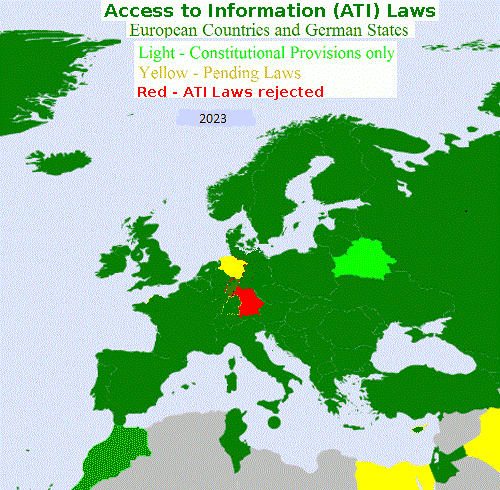
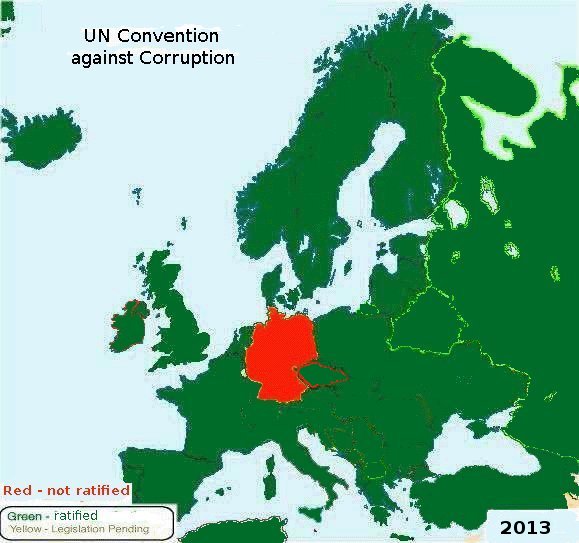
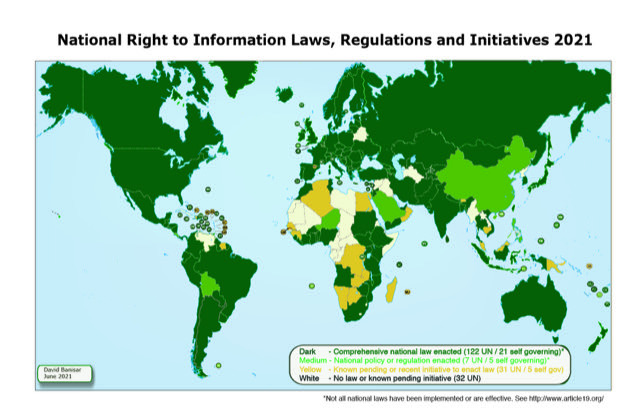
Separation of powers in Europe:
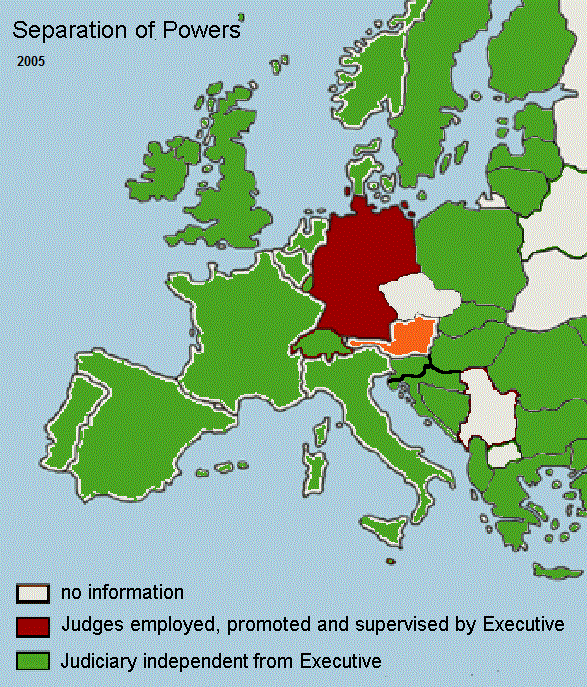
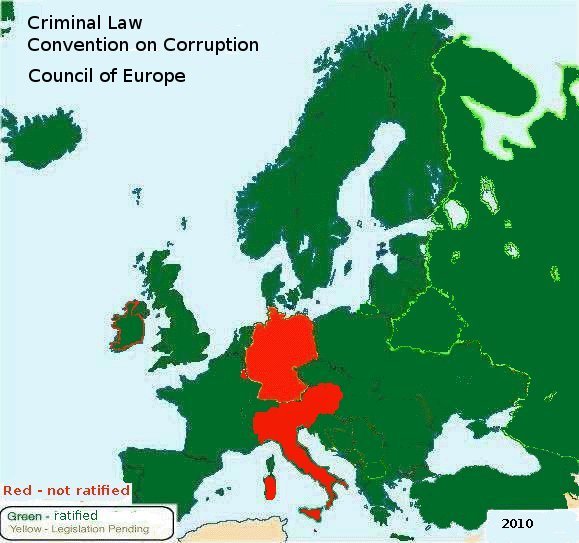
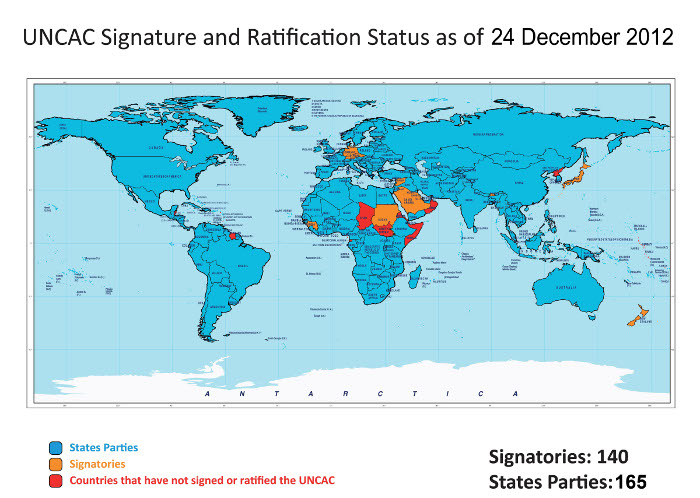
Defamation in Europe:
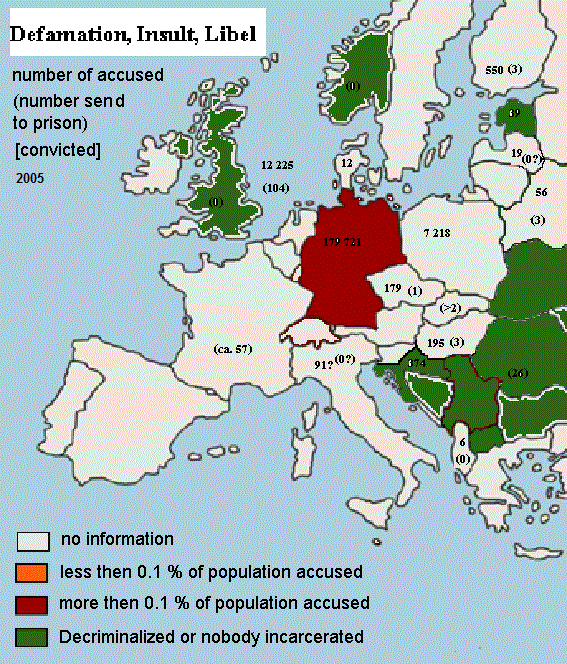
 auf Deutsch über das gleiche Thema:
http://wkeim.bplaced.net/files/familienrecht.htm
auf Deutsch über das gleiche Thema:
http://wkeim.bplaced.net/files/familienrecht.htm auf Deutsch über das gleiche Thema:
http://wkeim.bplaced.net/files/familienrecht.htm
auf Deutsch über das gleiche Thema:
http://wkeim.bplaced.net/files/familienrecht.htm
since 4. January 2012